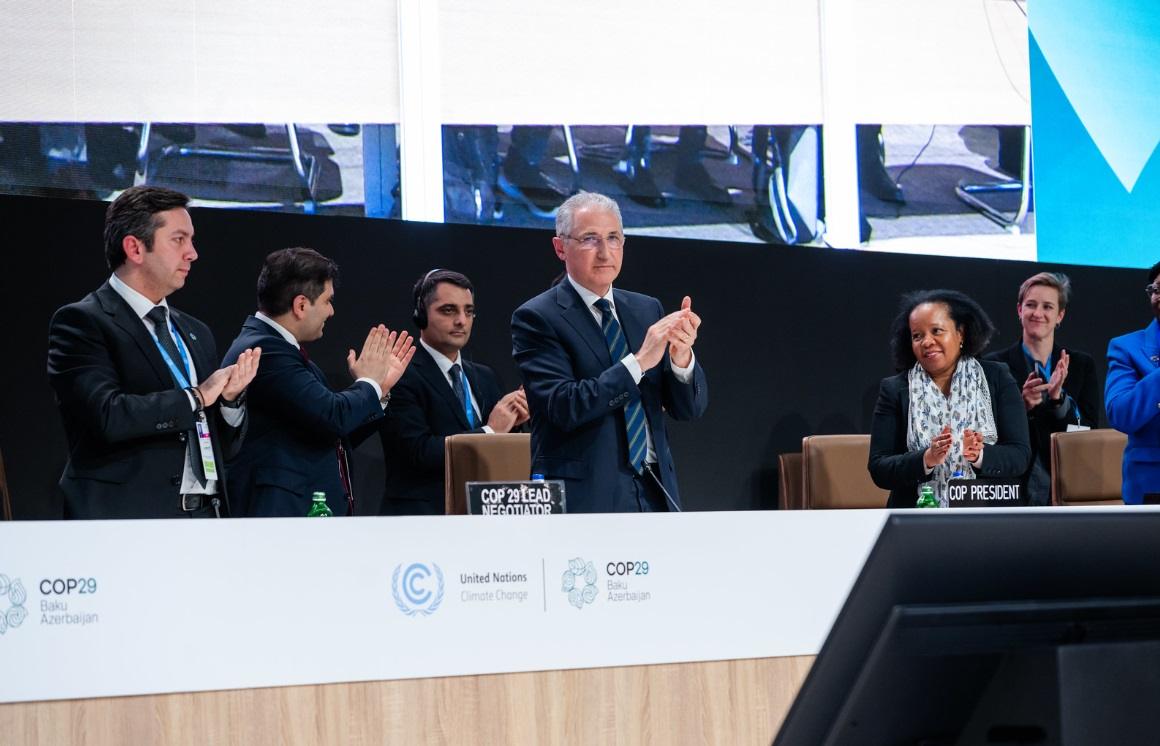COP29 Ends with Agreements on Climate Finance, Carbon Markets
Following two weeks of intensive negotiations, the COP29 climate conference in Baku, Azerbaijan ended with an agreement to triple climate change-related finance flows to developing nations to $300 billion annually over the next decade, and with significant progress towards the development of international carbon markets.
Despite the steps taken at the conference, however, the climate finance goal was criticized sharply as being insufficient by developing nations, with India’s representative saying “we are extremely, extremely disappointed” with the agreement.
One of the key outcomes of the conference was an agreement on the creation of a New Collective Quantified Goal on Climate Finance (NCQG), aimed at aligning global financial flows with the objectives of the Paris Agreement, with nations agreeing that climate financing for developing nations should reach at least $1.3 trillion per year by 2035. The text was unclear on the sources of this financing, however, stating that it would include “the scaling up of financing to developing country Parties for climate action from all public and private sources.”
While leaving the details behind the $1.3 trillion target unfinished, the agreement included the launch of an initiative to develop plans to develop the new ambition over the next year, dubbed the ““Baku to Belém Roadmap to 1.3T,” in reference to next year’s COP30 session in Belém Brazil.
As part of the broader target, the agreement also included a goal for developed countries collectively to mobilize at least $300 billion for developing countries by 2035, from “a wide variety of sources,” including “public and private, bilateral and multilateral.” This would represent a significant increase in climate finance for developing nations following a $100 billion by 2020 goal initially set in 2009, and extended to 2025 by the Paris Agreement in 2015. By 2020 annual climate finance mobilization had reached $83 billion, according to OECD estimates.
While highlighting the new goal as “an insurance policy for humanity, amid worsening climate impacts hitting every country,” Simon Stiell, Executive Secretary of UN Climate Change, acknowledged that “like any insurance policy – it only works – if premiums are paid in full, and on time. Promises must be kept, to protect billions of lives.”
In a statement following the agreement, however, India’s representative Chandni Raina harshly criticized the $300 billion goal, saying that “the amount that is proposed to be mobilized is abysmally poor, it’s a paltry sum,” adding that it would be insufficient to “enable conducive climate action.”
Another key takeaway from the close of COP29 was a final agreement on Article 6 of the Paris Agreement, aimed at establishing high integrity carbon markets, following an initial breakthrough in the opening days of the conference on establishing standards for a centralized international carbon market. In the closing days of the conference, an agreement was reached on country-to-country carbon market trading, or “Article 6.2,” detailing how countries will authorize carbon credit trading and how registries tracking this trading will operate.
Environmental groups welcomed the agreement on carbon markets, while noting that some problems ensuring integrity in the markets remains.
Rueban Manokara, WWF Carbon Finance and Markets Taskforce, Global Lead, said:
“Nearly ten years on since the Paris Agreement, it is a significant milestone to see the last remaining Article get approval to begin operating. The agreement is a compromise that reflects the challenging negotiations that have been underway since 2015, but ultimately it is positive that there is now further guidance on how Article 6 mechanisms will operate. While the final text is not perfect, it provides a degree of clarity that has long been absent from international efforts to coordinate emissions trading and carbon crediting.”
Carbon markets-focused NGO Carbon Market Watch (CMW), however, was critical of the agreement, saying that it “risks facilitating cowboy carbon markets at a time when the world needs a sheriff,” noting that countries will not face any significant repercussions if they fail to abide by the rules.
Jonathan Crook, Policy Lead on Global Carbon Markets at CMW said:
“Offering marginal improvements to transparency provisions, the package does not shine enough light on an already opaque system where countries won’t be required to provide information about their deals well ahead of actual trades. Even worse, the last opportunity to strengthen the critically weak review process was largely missed. Countries remain free to trade carbon credits that are of low quality, or even fail to comply with Article 6.2 rules, without any real oversight.”





